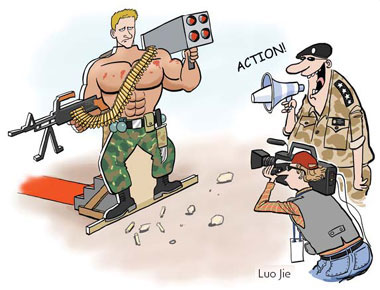Prince Harry's war just a blatant PR stunt
By Peter Wilby (China Daily)
Updated: 2008-03-05 07:33
Updated: 2008-03-05 07:33
Kings and princes used to go into battle at the head of their soldiers, standards flying. Nobody thought it right to hide Henry V or Richard III while they were doing battle with the enemy.
But the modern military wants the symbolic benefits of royal leadership without undue risk to the royal personage. In the case of Prince Harry, Britain's Ministry of Defense (MoD) had its cake and was allowed by the media to eat it as well.
"One of our boys," proclaimed the Sun newspaper's front page. "Our army of readers salutes you, Harry," added a souvenir poster across the center spread.
He had "killed up to 30 of the enemy" and showed "enormous courage. He came under enemy rocket, mortar and machine-gun fire almost every day".
"Harry and the Gurkhas give the Taliban a pasting," announced the Daily Express. He was "fighting the fanatics", advised the Daily Mail.
Harry was quoted as explaining that "you are doing a job and it is all worthwhile" and added that "it is somewhat like what I imagine World War II to be like". Some papers gave the story a dozen pages. The Guardian also gave it two, plus the front.
To my mind, this was propaganda for a war of dubious legitimacy and declining public popularity. The positive publicity for the Afghan War and the royal family - both of which are opposed by a significant proportion of the British- was priceless.
The access to Prince Harry was inevitably controlled and material pooled so that all outlets had roughly the same story. It is an example of what Nick Davies, in his new book Flat Earth News, calls "churnalism", whereby journalists faithfully reproduce a version of reality that has been pre-packaged by public relations.
Were we going to hear anything from Harry about shortages of equipment, the justice of the war, or the likelihood that it will never be won? Of course not.
The MoD agreed last year that, in return for keeping quiet about Harry's deployment to Afghanistan, TV and newspapers would get pictures of the prince in action, extended interviews and details of how he fought "the enemy".
The media would be free to run that material after Harry returned home, or earlier if the story leaked elsewhere.
Though there was a leak as early as January 7 on an Australian magazine website, the blackout in the British mainstream media ended only when the more widely read US website, the Drudge report, broke the news last Thursday.
Drudge's story was neither anti-British nor anti-war. It faithfully followed the MoD script, describing Harry as "a magnificent soldier" and "an inspiration to all of Britons [sic]". By Friday, Harry was on his way home. Job done. The Drudge leak was only a minor inconvenience.
The whole thing was a public relations, from beginning to end, a more extended version of the politicians' visits which the media also keep quiet about in advance. But the media's self-denying ordinances for politicians last only a day or two.
Blow to journalism
In Harry's case, the public was kept in the dark for more than two months. It was described as "a gentleman's agreement".

But these days, news blackouts most commonly involve kidnappings, hijackings and sieges, where the police fear publicity might jeopardize operations and risk lives.
More generally, security matters have long been governed by the D-notice (now sanitized as "defense advisory") system, under which editors can consult a government committee about material potentially damaging to the national interest.
I have always been suspicious of D-notices which are, in any case, more difficult to apply now readers, to say nothing of potential enemies, can access Internet sources across the world.
Authority has a natural propensity to secrecy, and newspapers should be wary of colluding to keep information from their readers. The system feeds the opinion that the press is in cahoots with powerful interests to suppress the truth about such matters as crop circles, flying saucers, 9/11 and the death of Diana.
In theory, it benefits newspapers because editors can establish what they can safely publish without running the expensive and dangerous risks of court injunctions and prosecutions under official secrets legislation.
In reality, however, it has often been used merely to keep embarrassing subjects, such as the extent of telephone-tapping by the intelligence services, out of the media.
I can see why editors agreed to the Prince Harry deal. I might have done so myself. But please spare us praise for the editors' responsible behavior and public spirit. They did what they thought best for their news operations, sales and brand images. They dealt another blow to genuinely independent journalism and to the long-term credibility of the media.
It is preposterous to pretend Prince Harry can be an ordinary soldier. He is a pawn in a public relations game. The army was free to keep him out of the frontline if it judged the risks to him and his fellow soldiers unacceptable.
It preferred to continue reaping the brand benefits of a royal on active service. He gives the army a glamor it might otherwise lack, and he boosts the morale of serving soldiers.
For precisely the same reasons that the Taliban or other terrorists would want to capture or kill him, the MoD wanted Harry in Afghanistan and it wanted the story written up in detail.
He was a trophy for the MoD as, if things had gone wrong, he would have been for the Taliban. The MoD succeeded brilliantly; for once, a government department showed it can do something well. But newspapers and broadcasters should stop patting themselves on the back.
The Guardian
(China Daily 03/05/2008 page10)
|
|
|
|
|
|